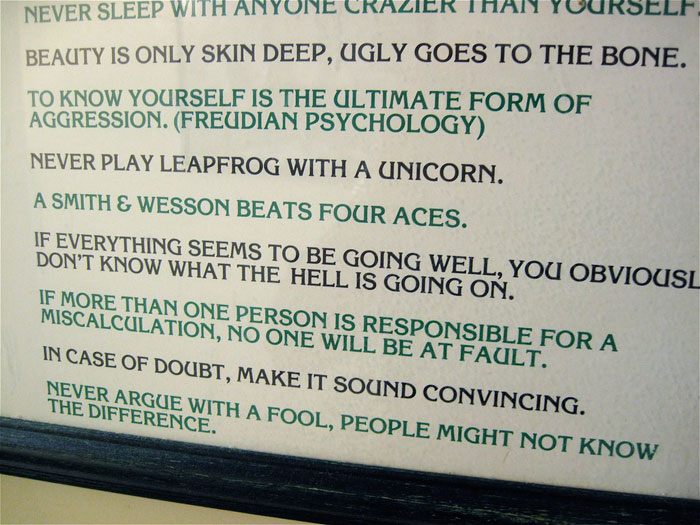The meaning of Murphy’s Law
As we hold the surname Murphy we hold Murphy’s Law in high esteem, we understand that sometimes things in life don’t always go as planned and you just have to start again and always keep trying.
In general, Murphy’s Law declares, “if there is anything that could go wrong, it will eventually go wrong” (and usually, in the worst possible moment). There is no scientific proof behind Murphy’s Law but it is an analogy that might help people reduce mistakes and look at life with an Irish light heartedness.

However society has given Murphy’s Law a second humorous meaning that has become very popular and sometimes has created some confusion. They tend to apply it to funny situations that have nothing to do with the original intention of the law.
For example, if you are standing in line and the line next to you moves faster, as soon as you stand in the other line (in order to move faster) it will stop moving and your original line will start advancing.
This is called: “The other line will always move faster.” Another example is: the day you decide to wash your car, it will rain. Some people interpret this behaviour as: life is hard and humour can make us withstand that.
How this second meaning was created is a mystery and the great acceptance that it has in society could be considered as a social phenomenon.
Why is it called Murphy’s Law?
The question everyone asks at some point is: Who is Murphy? The person this law refers to is Capt. Edward A. Murphy Jr. He was an engineer working for the Air Force in Project MX981.
The goal was to test human resistance to g-forces in quick decelerations. It is said that one day in 1949, after he found a transducer was wired inappropriately, he scolded the technician who did this job and told him that “if there was any way to do it wrong, he would find it”.
The project manager kept a book with “laws” and added this one, which he called “Murphy’s Law”.
After the success of the project, Dr. John Paul Stapp (An Air Force doctor), said to the press that their upstanding safety record in this project was achieved because of their strong belief in “Murphy’s Law” and their great desire to bypass it. After this, Aerospace manufacturers mentioned this law in their adds for several months. After that, this law appeared in the news, several magazines, books, and publications and it became popular.
Who wrote Murphy’s Law?

Some people say that the concept of Murphy’s Law is not new. Sod’s Law, which is a lot older, states the exact same thing. Murphy’s Law is popular in the United States and Sod’s Law in Ireland, however we do refer to Murphy’s Law too.
There is no record that proves when Sod’s Law was created.
There were several precursors of Murphy’s Law. Mathematician Augustus de Morgan wrote a similar phrase in 1866. Alfred Holt wrote a related expression in a report in 1877 for a society of engineers.
Nevil Maskeline, a British magician, wrote a comparable remark in 1908. John Sack wrote an akin sentence in a mountaineering book in 1952.
They all mention the same concept (applied to different activities): do your work well by considering that any part of the entire job could fail. There is no way to prove when was the first time anyone mentioned the concept.
However, nowhere had this concept captured so much popularity and humour as in Murphy’s Law.
Murphy’s Law was first mentioned publicly by Dr. John Paul Stapp in the press conference stated above. In 1952 Murphy’s Law was brought up in a book by Anne Roe and considered it as the Fourth Law of Thermodynamics (there are actually only three laws).
In 1955, in the May-June issue of “Aviation Mechanics Bulletin” Murphy’s Law was mentioned. In the book “Men Rockets and Space Rats”, by Lloyd Mallan, this same law is also disclosed. In 1962, the Mercury astronauts talked about this law, too.
According to Arthur Bloch in his 1977 “Murphy’s Law, and Other Reasons Why Things GO WRONG”, Dr. John Paul Stapp is the person who used the term “Murphy’s Law” for the first time to refer to Capt. Edward Murphy’s remarks in the 1949 incident and all of its associations.
How to Interpret and Put into Practice Murphy’s Law
If you want to use Murphy’s Law seriously, you can use it to check your work for mistakes so that you can lower costs, diminish time delays, prevent disasters, etc.
All you have to do is prevent anything that could cause problems and check several times all the work to find and correct mistakes before things break down. Whenever you have doubts about whether something will go wrong, remember that it will.
This is a positive way of applying Murphy’s Law in our daily lives and many people do that even without being conscious about it. Clients and bosses tend to like work that is done this way.
Murphy’s Law can be used to prevent mistakes, but it is not an absolute reality. For example if you are building a machine that you are going to sell, according to Murphy’s Law every part of it will eventually stop working at some point.
That is in theory, but in practice many people get rid of their machines when the cost of fixing them is greater than the price of buying new ones. This means that not all of the parts will get to break down before the entire machine gets thrown away.
So this implies that not everything that could have gone wrong actually did (as the law states). Murphy’s Law is used for increasing the quality of work, but it is obviously not an absolute scientific truth.
If you want to use Murphy’s Law as a topic of conversation with your friends (or as a joke) you can mention that it cannot be outsmarted. If you are driving your car and intend to do something in the next red light (like search for a better song in the radio), you’ll probably get all green lights.
But it does not work the other way around. If you are in a hurry and want to get all green lights, pretending that you want to do something in the next red light will not necessarily work as you wish.
Why is it considered a joke or a funny law?
Probably because many times funny things happen. I remember when I was young, a friend told us that his brother was angry with him and put some books on top of the door of his room so that they would fall on my friends head as he entered.
What he didn’t expect was that the first person to enter the room was his mother, and she scolded him after getting hit by those books. That is Murphy’s Law in action.
This leads to an important issue: there are so many things that could backfire, that sometimes it is hard to predict which will create a problem.
Murphy’s Law and Psychology
Unfortunately, many people tend to take seriously the joke version of Murphy’s Law (when people apply it to bad luck) and believe that bad things tend to happen frequently. Good things happen, too.
Some people even say that this law is related with psychology and tend to find reasons why we all pay more attention to bad luck than to good luck.
Some of those reasons are actually quite interesting. For example, when something proceeds as planned, we don’t pay attention to the good luck we had because the outcome is exactly what we expected it to be.
But when something goes wrong, we tend to look for reasons why the result was different than expected. So this could explain why some people believe that we tend to have more bad luck than good luck (which is not true).
Some people even created the opposite of Murphy’s Law to show that they disagree with this negative vision of luck. It is called Yhprum’s Law (Murphy written in reverse) and it states that: If something can work correctly, it will.
There are no practical applications for this new law, but it could be interpreted as a sign of protest or disagreement.
Despite the fact that the relationship between Murphy’s Law and psychology can be very interesting, it is a huge misunderstanding.
If you analyze the history of its creation, Murphy’s Law makes us more attentive to check our work and hand it in with better quality.
That is all there’s to it. It has nothing to do with luck or psychology. When Murphy’s Law is applied to luck it is a joke intended to make us laugh and in this particular case, it has nothing to do with a serious vision of life.
Murphy’s Law and Entropy
In the Second Law of Thermodynamics, entropy states that all systems will gradually end up in chaos (lack of order). Somehow this can relate to Murphy’s Law, because it states that systems fail.
So Murphy’s Law shares a similarity with entropy, although they do not state the same thing. Entropy states that order is constantly lost and Murphy’s Law mentions that something will go wrong.
Murphy’s Law and Math
Mathematical formulas represent diverse aspects of our world.
They relate different ideas and show through mathematics the numerical relationship of different laws, theories and concepts, usually in the world of science (Physics, Chemistry, Astronomy, etc.).
The objective of these formulas is to explain these relationships, describe the logic behind the phenomenon being studied and predict the numerical outcome of certain specific situations. Many times you understand a scientific phenomenon better because of what the mathematical formula reveals.
Murphy’s Law uses a word that creates confusion: “Law”. It is not a law, it is an adage and it can be applied to so many different situations, that it is very hard to talk about a mathematical formula that can describe something constant in the vast variety of cases it covers.
Some people have really tried to do this, despite the odds. For example, Joel Pel is a biological engineer who created a formula that predicts results in certain situations described by Murphy’s Law.

Some people reject theses attempts and say that there’s nothing mathematical about Murphy’s Law.
However if you successfully represent reality mathematically in some specific cases and you can successfully predict the outcome of a given situation with the formula, there shouldn’t be any reason to reject it.
Murphy’s Law as a Social Phenomenon
Despite the serious nature of its birth (a Captain scolding a technician) and the usefulness of its application in improving the quality of the work people do, Murphy’s Law has become a very popular joke in our culture. The general concept has many applications in all areas of human life.
These are some examples of Murphy’s Law:
– Celibacy is not hereditary.
– Beauty is only skin deep, ugly goes to the bone.
– You find the object you have lost only after you have replaced it.
– If the problem looks too simple, you are overlooking something.
– Never argue with a fool, some people could not notice the difference.
– Friends arrive and leave, but enemies accumulate.
– The other queue always moves faster.
– Fixing anything will prolong and cost more than you expected.
– Whenever you go out to do something, something else had to be done earlier.
– A slice of bread will fall butter side down if the carpet is expensive.
– Nothing is as easy as it looks.
– A disaster will occur in the classroom when there are visitors.
– When the most difficult task awaits, you get the greatest number of interruptions.
– Every solution breeds new problems.
– If it seems too good to be true, it probably is.
– Smile… tomorrow things will get worse.
– The best designs never survive contact with the client.
– If it is raining, cold, or both, the bus will be late.
– There is always one more bug.
– It is impossible to make anything foolproof because fools are so ingenious.
– If your attack is going too well, you are walking into an ambush.

